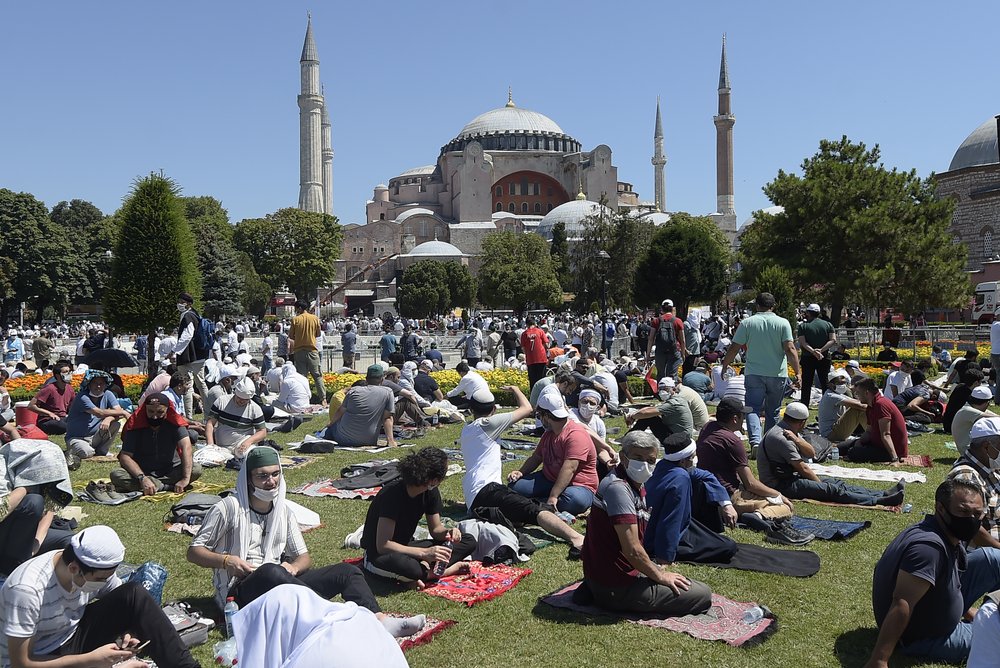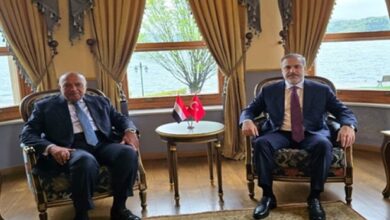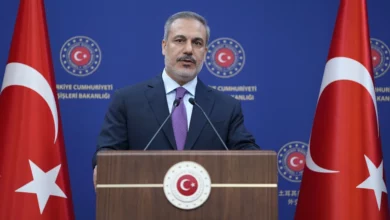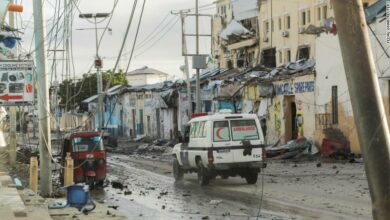
ISTANBUL (AP) — Thousands of Muslim faithful made their way to Istanbul’s landmark Hagia Sophia on Friday to take part in the first prayers in 86 years at the structure that once was one of Christendom’s most significant cathedrals, then a mosque and museum before its reconversion into a Muslim place of worship.
Turkish President Recep Tayyip Erdogan is scheduled to attend the inaugural prayers inside the sixth-century monument along with around 500 dignitaries, as he fulfills what he has described as the “dream of our youth” anchored in Turkey’s Islamic movement.
Thousands of men and women, including many who traveled from across Turkey, quickly filled specially-designated, segregated areas outside of Hagia Sophia, to be part of the first prayers. Several camped near the structure overnight. Dozens of worshipers broke through one police checkpoint to rush toward Hagia Sophia and social distancing practices, in place due to the coronavirus outbreak, were being ignored, Turkish media reported.
Orthodox church leaders in Greece and the United States, meanwhile, were scheduled to observe “a day of mourning” over the inaugural prayers.
Brushing aside international criticism, Erdogan issued a decree restoring the iconic building as a mosque earlier this month, shortly after a Turkish high court ruled that the Hagia Sophia had been illegally made into a museum more than eight decades ago. The structure, listed as UNESCO World Heritage site, has since been renamed “The Grand Hagia Sophia Mosque.”
The move sparked dismay in Greece, the United States and among Christian churches who had called on Erdogan to maintain it as a museum as a nod to Istanbul’s multi-religious heritage and the structure’s status as a symbol of Christian and Muslim unity. Pope Francis expressed his sadness.
Built by the Byzantine Emperor Justinian in 537, Hagia Sophia was turned into a mosque with the 1453 Ottoman conquest of Istanbul. Mustafa Kemal Ataturk, the founding leader of the secular Turkish republic converted the structure into a museum in 1934.
Although an annex to the Hagia Sophia, the Sultan’s pavilion, has been open to prayers since the 1990s, religious and nationalists group in Turkey have long yearned for the nearly 1,500-year-old edifice, which they regard as the legacy of Ottoman Sultan Mehmet the Conquerer, to be reverted into a mosque.
“This is Hagia Sophia breaking away from its captivity chains. It was the greatest dream of our youth,” Erdogan said last week. “It was the yearning of our people and it has been accomplished.” Erdogan also described its conversion into a museum by the republic’s founding leaders as a mistake that is being rectified.
In neighboring Greece, bells tolled and flags flew at half-staff at hundreds of churches across the country in protest at the decision to convert Hagia Sophia into a mosque. The Greek Orthodox Church leader, Archbishiop Ieronymos, will hold a special service at Athens Cathedral later Friday. Churches in Athens, Greece’s second-largest city, Thessaloniki, are also organizing vigils.
“Today is a difficult day […] a shadow hangs over us with the transformation of Hagia Sophia into a mosque — something that genuinely shocks Christians all over the world and not only Greeks,” Greek government spokesman Stelios Petsas said in an interview with private channel Open TV. “We have warned for some time that this will create an unbridgeable gap between Turkey and the Christian world.”
The history and religious traditions of the predominantly Greek-speaking and Orthodox Christian Byzantine Empire remain influential in Greece. The church protests also occurred amid a volatile dispute between Greece and Turkey over mineral rights in the eastern Mediterranean, with the Greek military on alert over a planned Turkish maritime survey in waters claimed by Greece.
In New York, the Greek Orthodox Archdiocese of America, called the inaugural prayers a “cultural and spiritual misappropriation and a violation of all standards of religious harmony and mutual respect.” Archbishop Elpidophoros of America held a meeting with US President Donald Trump and Vice President Mike Pence in Washington on Thursday to discuss concerns over the reconversion.
Turkey has vowed to protect Hagia Sophia’s artifacts and has said it will remain open to visits by Muslims and non-Muslims outside of prayer hours. The structure’s mosaics depicting Christian figures are being covered with sail-like white drapes during the prayers.
___
Suzan Fraser reported from Ankara, Turkey. Derek Gatopoulos in Athens contributed to this report.
Image: Faithful wait at the historic Sultanahmet district of Istanbul, outside the Byzantine-era Hagia Sophia, Friday, July 24, 2020. Hundreds of Muslim faithful were making their way to Istanbul’s landmark monument Friday to take part in the first prayers in 86 years at the structure that was once Christendom’s most significant cathedral and the “jewel” of the Byzantine Empire then a mosque and museum before its re-conversion into a Muslim place of worship. The conversion of the edifice, has led to an international outcry. (AP Photo/Yasin Akgul)




